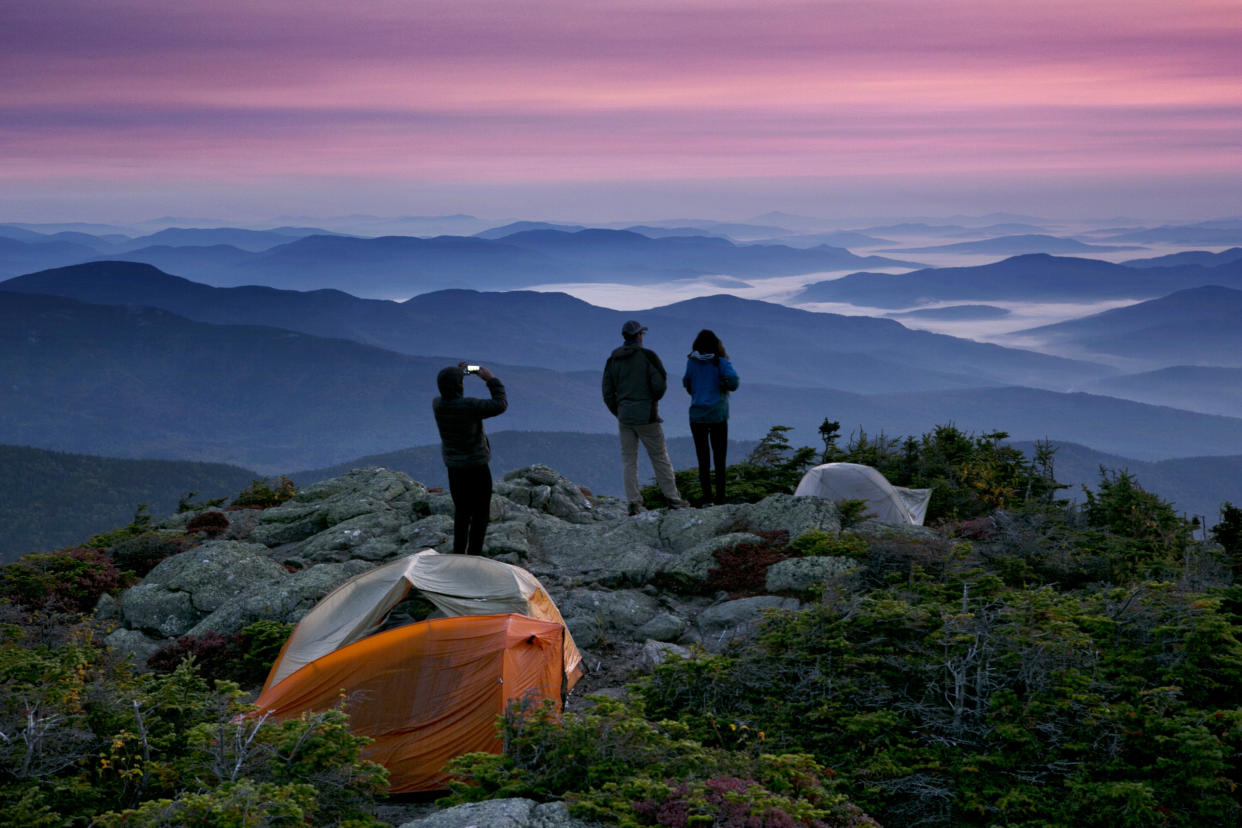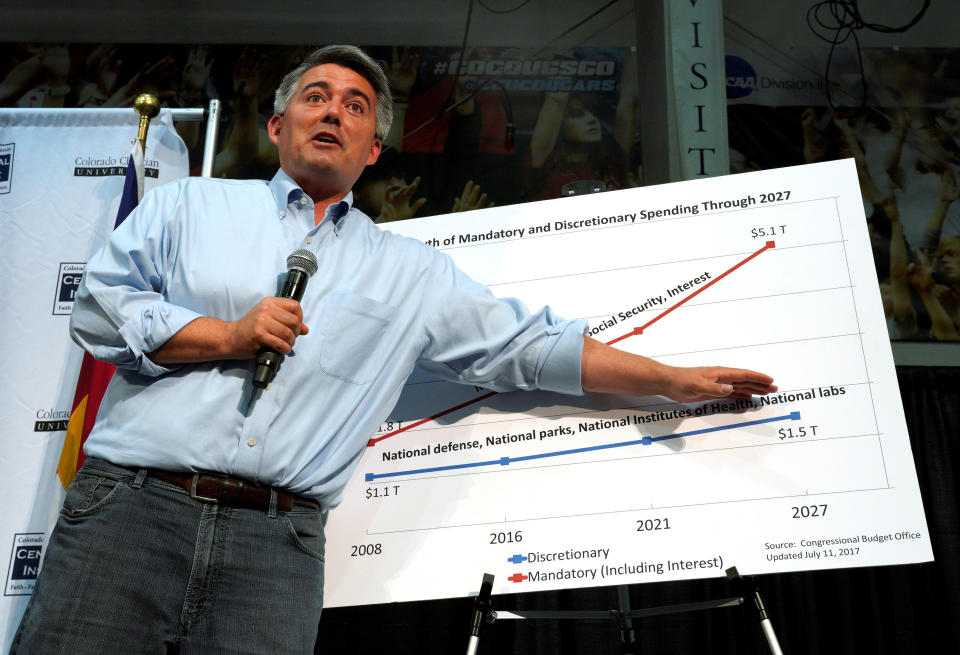How the Land and Water Conservation Fund, a program everyone loves, became a political football

A federal program that has protected natural areas throughout the United States and has provided recreation opportunities for Americans since the mid-’60s is set to expire on Sept. 30 — unless Congress acts.
The Land and Water Conservation Fund (LWCF), which Congress established in 1964, does not use taxpayer dollars. Instead, earnings from offshore oil and gas leasing go to federal, state and local governments to acquire and protect forest, water and wildlife areas. In nearly every congressional district, LWCF helped set up recreational activities on these public lands, including playgrounds, sports fields, picnic sites, community recreation centers and hiking trails. The Grand Canyon, the Appalachian Trail and Central Park have all benefited from LWCF.
If LWCF enjoys widespread support among Democrats and Republicans, why is it so close to expiring? Congress has become synonymous with gridlock and inactivity, so it’s not too surprising that an issue would be neglected while the clock is ticking. But it is somewhat astonishing that this would happen to a beloved federal program with cross-party support.
There’s a contingent of conservatives who say LWCF has been misused to facilitate government land grabs. But they mostly just want it to be reformed — not eliminated. They argue that LWCF money should go toward the deferred and routine maintenance of public land we already have rather than to more acquisitions.
Jon Asher, a senior representative in government relations for the Wilderness Society, a land conservation nonprofit, said LWCF is not nearly as controversial in local communities as it is in Washington.
“Trump-supporting conservative county commissioners love the program, and then on the flip side folks who are more liberal love the program as well,” Asher told Yahoo News. “Unfortunately, things that are incredibly popular off the Hill can become politicized on the Hill, no matter what happens.”
According to Asher, LWCF is a victim of its own success and popularity, and some more moderate Republicans are willing to hold LWCF hostage to push through other policies that don’t have bipartisan support.
“Because it’s so popular, you have members who see it as something that can get votes. They like to keep it around in case they can attach it [to a proposal with less bipartisan support]. They don’t want it to move without compromise or concession on things they care about.”

Asher denied that LWCF has turned into an engine for government land grabs and said roughly 90 percent of any federal investment into LWCF goes toward purchasing inholdings: privately owned property within the boundaries of a national park or other protected area. The idea is to keep someone from building, say, a trophy home in the middle of Grand Teton National Park.
“There’s a divide there where, ideologically, [small government conservatives] want to be purists, but the reality is there are special places,” Asher said. “LWCF isn’t just going out buying up millions of acres of formerly private land, as they like to sometimes paint a picture that it does.”
As an example of targeted, specific acquisitions with broad local support, he said access routes to popular trails or climbing areas are sometimes on private property, so permission is needed to reach them.
“In working with local communities and willing private landowners, those kinds of surgical acquisitions can really exponentially increase conservation or recreation values,” Asher said.
It’s not uncommon for a program to expire but then get renewal and receive further funding. In December 2015, after LWCF expired for the first time in 50 years, Congress voted to extend its authorization for another three.
But Asher said the Wilderness Society is concerned that the Trump administration may be a wild card. Interior Secretary Ryan Zinke said he supports LWCF but he cut the program’s acquisition budget by 95 percent in its fiscal 2019 budget proposal, arguing that the government has a backlog for maintaining the national parks and that this should be addressed before any further land acquisitions are funded.

“We’ve been unnerved about what used to be a very small minority of members espousing those views,” Asher said. “In terms of reauthorization, it’s a new political element we are certainly concerned about.”
There is an environmentalist movement within the Republican Party that supports the goals of conservation but thinks the way to protect natural resources is by the free market.
Holly Fretwell, a research fellow at the Property and Environment Research Center (PERC), a nonprofit dedicated to conservation through “property rights and markets,” said a number of people are concerned with the unintended consequences of LWCF spending and would support reform to clarify that funds go toward maintaining the public land we already have rather than acquiring more of it.
She said it’s a myth that most LWCF funding goes toward local outdoor recreation projects and that the overwhelming majority goes toward land acquisitions. She said Congress hardly ever appropriates the full amount of available royalties to the fund. PERC has called on Congress many times to clarify the intended use of the “Other Purposes” category of the fund so that the federal portion goes toward maintenance of federal land.
She agrees that acquiring inholdings has benefits, such as streamlining the cost of management, but she said LWCF is too often used to acquire additional public land outside existing boundaries.
“For example, we have 23 new park units in the last decade. Those cost a lot of money, and we can’t afford to care for what we already have, hence the big backlog,” Fretwell said. “So that part of the LWCF becomes very problematic. That does not suggest that the fund should just disappear, but we should make sure we’re using that fund to take care of land we already have and prioritize those over additional land acquisitions.”

“There is bipartisan support for LWCF. I don’t think many people out there are saying it should just go away, but we could use those funds in a much smarter way so we’re better enhancing our public lands,” Fretwell said.
Fretwell said the issue of public lands is a highly emotional and polarizing one. “That in my mind is really frustrating,” Fretwell said. “In order to make a difference, people have to understand the full story rather than just one emotional aspect of it. It’s really important for us to share that full story.”
In Congress, Sen. Richard Burr, R-N.C., has been leading a cross-party push to permanently reauthorize LWCF. He and Sen. Maria Cantwell, D-Wash., introduced bipartisan legislation earlier this year to achieve that goal. In fact, there are currently three pieces of bipartisan legislation that would save LWCF: H.R. 502 (permanent reauthorization), S. 569 (permanent reauthorization and full funding) and S. 896 (permanent reauthorization).
On June 20, Burr and others held a bipartisan press conference calling for the permanent authorization of LWCF. He said LWCF generates almost $900 billion in economic revenue from consumer spending and $65 billion in federal tax revenue — at no cost to the American taxpayer. Burr said he only wants what LWCF’s founders envisioned — that 100 percent of the royalty dollars from exploration go to LWCF and that funds are not siphoned off for other purposes.

“This is one of the most important conservation programs in America, and taxpayers are the beneficiaries of it, not the funders of it,” he said at the press conference.
When the Wall Street Journal’s editorial board wrote that the fund is “largely a slush fund for government land grabs, but it’s politically untouchable because it reminds people of Old Faithful and camping trips,” it prompted a rejoinder from Burr.
On June 20, the Republican-controlled Senate blocked Trump’s so-called rescissions package that would have returned nearly $15 billion in unused government money back to the treasury and withdrawn previously approved spending, including funds for LWCF. Most Republicans — feeling that March’s $1.3 trillion spending bill was too big — embraced the plan, but Burr and Sen. Susan Collins, R-Maine, joined the Democrats to defeat the measure by 50 to 49.
Sens. Steve Daines, R-Mont., and Cory Gardner, R-Colo., have said they support continued funding and appeared at the press conference with Burr but voted with the rest of the party to bring the rescissions package to the floor — earning a rebuke from the League of Conservation Voters (LCV) in the form of more than $50,000 in digital attack ads.
A Daines spokesperson told Yahoo News: “Senator Daines believes it is just common sense to send unused tax dollars back to the Treasury Department. This should be something all members of Congress can agree on.”
Alex Taurel, the deputy legislative director at the LCV, told Yahoo News, “We need supposed supporters of the program to actually step up. This is a moment where it’s not enough to just be a co-sponsor of the bill or speak at a press conference. We actually need to demand real action from Republican leaders.”

Casey Contres, a press secretary for Gardner, called the attack by LCV “pretty crazy, confusing and unfortunate.”
“They voted to advance debate — but the bill never came up for vote. If anything – this may be a story about a group falsely accusing Sen. Gardner over something they know he’s doing a lot of work on,” Contres told Yahoo News. “The amendment was backed by Burr and several others that would have restored the $16 million. However, since the legislation was never voted on, Gardner couldn’t offer the amendment.”
So, where do we stand? There’s a widely beloved federal program with bipartisan support, despite disagreements over how it’s implemented, that has prompted environmentalist groups and politicians to attack and praise each other in equal measure for their alleged support or lack thereof for the program. In short, something so beloved that it could have brought Republicans and Democrats together has become a political football.
Kelly M. Reed, the vice president of government relations for the Conservation Fund, an environmental nonprofit, said it can be difficult to glean a politician’s motivations behind larger votes that include LWCF. She said there’s enormous support whenever there’s a standalone LWCF vote. The anti-LWCF Lankford amendment in April 2016 was defeated in the Senate by 18 Republicans and 45 Democrats. The Senate passed an energy bill that month that included permanent LWCF reauthorization by 85 votes. However, legislators never resolved the House and Senate differences before the 114th Congress ended on Jan. 3, 2017, and all legislation had to start at square one for the current 115th Congress.
Reed pointed out that the same LWCF language was included in the 2017 Senate Energy and Natural Resources Committee’s energy bill, but it has not yet come to the floor for a vote. She said this would permanently reauthorize but not permanently fund LWCF.
Reed characterized the LWCF as a “grand bargain” between resource extraction and resource protection on behalf of the American people, and that has financial reverberations that make it an important economic engine.
“LWCF is such a win-win program with huge support, significant and widespread benefit at no cost to the taxpayers, all the benefits to the American public and significant state and local control. What’s not to like about it?” Reed said. “It would be inexcusable for the United States Congress not to reauthorize it and continue to advance this American priority.”
_____
Read more from Yahoo News:



